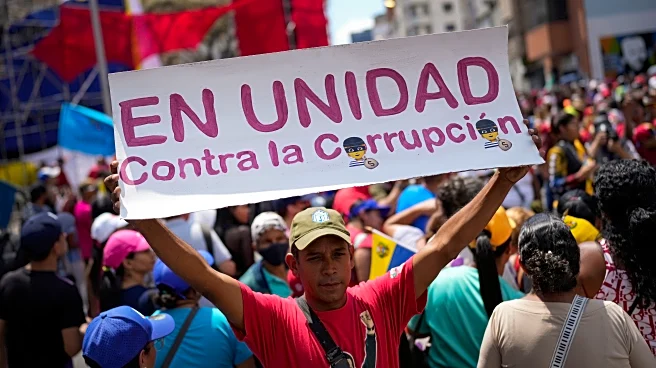What's Happening?
Steve Bannon, a former advisor to President Trump, has suggested a plan that could potentially allow Trump to serve a third term as President. In an interview with The Economist, Bannon claimed that Trump would
be president again in 2028, despite the constitutional limitations set by the 22nd Amendment, which prohibits a person from being elected to the presidency more than twice. Bannon did not provide specific details on how this would be achieved but hinted at various alternatives and a plan to redefine terms within the amendment. This announcement has raised alarms among critics who view it as a serious threat to constitutional norms.
Why It's Important?
The suggestion of a third term for President Trump challenges the established constitutional framework of the United States, which limits presidential terms to ensure democratic governance and prevent authoritarian rule. Bannon's comments have sparked significant concern among political analysts and critics, who argue that such rhetoric undermines the rule of law and democratic principles. The potential implications of this plan, if pursued, could lead to a constitutional crisis and further polarization within the U.S. political landscape. Critics emphasize the importance of adhering to constitutional limits to preserve democratic institutions.
What's Next?
While Bannon has not disclosed the specifics of his plan, the proposal is likely to face significant legal and political challenges. Constitutional scholars and political leaders may engage in debates over the interpretation of the 22nd Amendment and the feasibility of such a plan. Public and political reactions could influence the discourse around presidential term limits and the broader implications for U.S. democracy. The situation warrants close monitoring as further details emerge and stakeholders respond to the potential ramifications of Bannon's proposal.
Beyond the Headlines
Bannon's proposal raises questions about the influence of political figures who seek to extend their power beyond traditional limits. It highlights the ongoing tensions between populist movements and established democratic norms. The discourse surrounding this issue may also reflect broader societal concerns about the concentration of power and the role of charismatic leaders in shaping political futures. The situation underscores the need for vigilance in upholding democratic principles and the rule of law.











